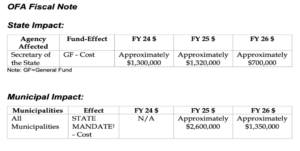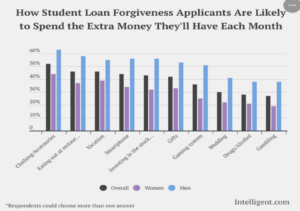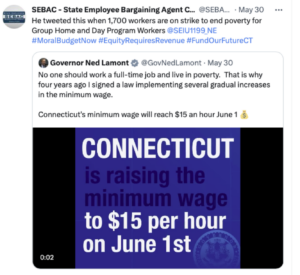Paying Extra to Avoid the Burden of in Person Voting
Both the House and Senate approved to change the state Constitution to allow early voting in Connecticut, complying with 60.2 percent of voters who favored amending the state constitution and allowing for in-person voting during the 2022 election. The bill now awaits Gov. Ned Lamont’s signature.
Once signed, Connecticut will join 46 other states that allow for some form of early voting starting in 2024. Voters will be allowed to vote 14 days early for general elections, seven days for primaries and four days for special elections.
However, lawmakers weren’t entirely transparent on the costs of implementing early voting. The Office of Fiscal Analysis (OFA) the bill will “result in a significant ongoing labor cost to the state and municipalities.”
A proposed amendment shortened the number of days for early voting, limiting the scope to general elections and primaries, while reducing hours and number of locations available that would — according to OFA — cut costs by roughly $2,100,000. However, spending other people’s money comes too easily in Connecticut and the amendment failed across party lines.
Speaker of the House Matt Ritter (D-1) stated in a press conference on Wed. (May 31) that the budget will include money to help municipalities cover the cost. But, the funds are only enough to help pay for one early voting location. Cities and towns wanting to open more locations will be paying out of their own coffers.
Early voting has not been as easy to implement as advocates have proclaimed. One only needs to look north to Massachusetts. The Bay State has offered early voting since 2016 (17 days before state biennial elections and 10 days before presidential or state primaries), yet local election officials are still challenged to strike a balance between convenience, obeying the law and staying within their budgets.
Though early voting has proved to be popular for some in Massachusetts, it has been disenfranchising less affluent communities as shown in a 2021 MassVote report that found municipalities with large minority populations have seen significantly lower voter turnout.
For those who haven’t figured out when Election Day in Connecticut occurs, they will still be allowed same day registration. Every early voting polling place for general elections will also be utilized for same day registration.
Republicans offered an amendment to would require photo identification but failed to get support from the other side. Current Connecticut law does not require identification to vote.
You May Not Even Have to Get Off the Couch to Vote
To make voting even more convenient, the Senate passed a resolution (26-8) — already approved by the House (113-38) on May 10 — to ask voters whether to abolish the constitutional barrier to no-excuse absentee ballots. The question will now be put forth to voters in the 2024 elections.
For a constitutional amendment to appear on a ballot, it must either be approved by a 75% majority in both House and Senate in a single year or a simple majority in both chambers in two consecutive legislative terms.
In the 2021 session, the resolution passed 27-9 in the Senate and 104-44 in the House, meaning it has passed the test for the question to appear on ballots in the upcoming statewide election.
However, removing absentee ballot restrictions hasn’t fared well when put before voters — like back in 2014, when the measure failed by almost 40,000 votes.
Fingers crossed that the fiscal implications are revealed to voters before November 2024.
Taxpayers to Fund College Grads Travel, Smartphones and Drugs
On Thursday (June 1) the House passed a bill that will create a grant program that will reimburse certain individuals for student loan payments.
Each program participant will be eligible to receive up to $5,000 annually and no more than $20,000, over four years of participation in the program.
To be eligible, participants must be residents of the state for at least five years; have an adjusted gross income of less than $125,000 for individual filers and $175,000 for joint filers; have a student loan from any state public or private college; hold an occupational or professional license; and have left college in good academic standing before graduation.
In exchange for this generous payout — funded by taxpayers including those who did not pursue further education after high school — recipients will have to volunteer a grueling fifty unpaid hours for each year of participation.
Rep. Gary Turco (D-27), one of the bill’s proponents, said this legislation is going to, “drastically improve” the lives of those fortunate enough to further their education after college. He also noted that “the reduction is going to allow that person to help pay for their basic necessities.”
When President Joe Biden announced his plan to reduce student loan debt by up to $20,000, data analysts at Intelligent surveyed those that applied or planned to apply, and found that 73% of applicants said they would likely spend their extra money on nonessentials, including vacations, smartphones, or drugs/alcohol.
The survey also showed that two times as many Democrats than Republicans say it would be acceptable to spend the money on non-essentials. Men were more likely than women (84%-65%) to spend on non-essentials.
Equity must be so 2022 because how equitable is it to have a taxpayer with a high school education, making much less than $125,000 a year foot the bill for a college graduate’s wedding or PlayStation?
Protesters Show Up a Year Late
Last Friday (June 2) over 1,700 unionized group home and day program workers went on strike demanding living wages, affordable health insurance and a pension.
SEIU 1199 — the union representing these workers — is demanding an additional $400 million in the state budget ($200 million in state funds and $200 million matched by federal funds) in Medicaid funding for group homes and day programs that care for individuals with disabilities.
To show they mean business, workers decided to protest, blocking traffic in front of the Connecticut State Capitol. More than 50 were arrested, including SEIU 1199 President Rob Baril who said, “We’re trying to have what impact we can on the state budget. We need the state of Connecticut to step up.”
However, a special session was called in February and a bipartisan bill was passed and signed by Gov. Lamont that extended the state’s cap on spending and bonding. Because of these caps, it is unlikely the state will be able to meet SEIU 1199’s demands.
Protesters may have been more successful with their negotiations with the state if they had shown up last year to protest the $1.9 billion, four-year agreements between Gov. Lamont and the State Employees Bargaining Agent Coalition (SEBAC). All told, state employees received raises averaging more than 15 percent with some topping 20 percent. The cost estimate of the deal worked out to more than $41,000 per state employee.
Ironically, SEBAC showed solidarity with SEIU 1199 by mocking Gov. Lamont when he announced the state’s minimum wage was increasing to $15 starting June 1.
Budget Details Still Locked Away in the Fortress of Bureaucracy
With three to four days left of session, details on the roughly $50 billion biennial state budget are still under wraps.
Speaking at a press conference on Wednesday, House Speaker Ritter, said there is a chance the budget could be called for a vote as early as Saturday (June 2). He indicated that the budget will be a bipartisan, but did not rule out having any major bills added at the last minute.
Only a Few More Days to Have Your Voice Heard
Visit our Take Action Center to view bills that Yankee Institute is monitoring. Simply click on the Take Action button to contact your state representative.
🚨 Tell lawmakers to VOTE YES on SB135 to reduce occupational licensing fees and make it easier for Connecticut residents to thrive.
Click Here to tell your representative to VOTE YES!
🚨 Tell lawmakers to VOTE YES on HB6710 to allow small businesses and non-profits to offer better health insurance.
Click Here to tell your representative to VOTE YES!
This Week on Yankee Institute’s Podcast Y CT Matters
Rep. Rachel Chaleski (R-138) talks about her fight for funding for a charter school in Danbury.
Click HERE to listen




